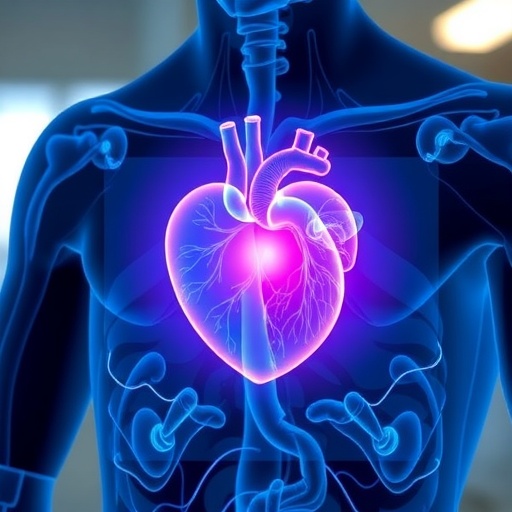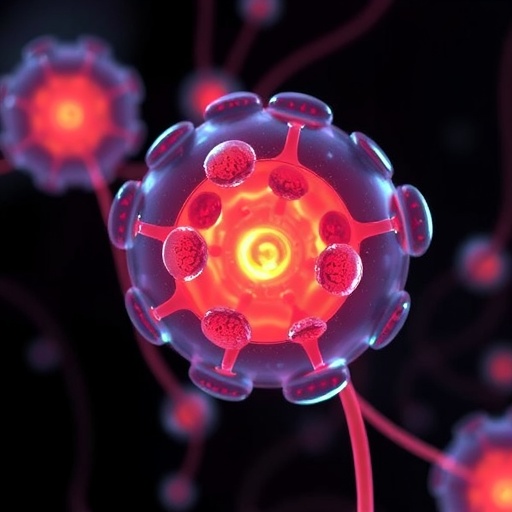
In an exciting advancement in cancer therapy, researchers have developed a novel approach to target tumor-associated macrophages (TAMs), which play a critical role in the tumor microenvironment and influence cancer progression. The study, led by a team including Henriques, Glass, and Hoek, focuses on reprogramming these macrophages using cytokine-loaded injectable cryogels specifically designed for breast cancer treatment. The implications of this research are profound, as it could lead to more effective therapies that leverage the body’s immune system to combat cancer.
Cytokines are signaling proteins that are crucial for cell communication in the immune system. They can help regulate immune responses, inflammation, and cell growth. However, their therapeutic use has been limited by factors such as stability, delivery, and undesired systemic effects. The innovative strategy employed by the researchers involves encapsulating these cytokines within injectable cryogels, which are biocompatible materials capable of releasing their contents in a controlled manner at the tumor site. This localized delivery could enhance the efficacy of the treatment while minimizing systemic side effects.
The research highlights a significant shift towards personalized medicine in the treatment of breast cancer. By targeting the tumor microenvironment and specifically the macrophages within it, the therapeutic approach can be tailored to individual patient profiles. These reprogrammed macrophages have the potential to transition from a pro-tumorigenic state to an anti-tumor one, facilitating the elimination of cancer cells and improving patient outcomes. The precision that this technique offers could revolutionize how breast cancer is treated, potentially reducing reliance on traditional therapies like chemotherapy and radiation.
One of the most critical aspects of this research is the method of delivering these cryogels to the tumor site. The injectable nature of the cryogels allows for minimally invasive procedures, which is a significant advantage over traditional surgical approaches. This not only reduces recovery times for patients but also widens the potential for integrating this therapy into existing treatment regimens. With advancements in medical imaging, clinicians can accurately target tumors, ensuring that the cryogels are delivered precisely where they are needed.
As the researchers delve deeper into the functionalization of these cryogels, they aim to enhance the bioactivity of the encapsulated cytokines further. By modifying the cryogel structure, it may be possible to control the release rates of the cytokines, optimizing the immune response over time. This level of control is vital for maintaining the necessary cytokine levels to ensure a sustained attack on tumor cells, potentially leading to longer-lasting remissions in patients.
The implications of this research extend beyond breast cancer. While the current study focuses on this specific type of cancer, the underlying principles could be adapted for use in other malignancies. The versatility of cryogel technology opens doors to targeting various tumor microenvironments, adjusting the encapsulated factors to meet the unique needs of different cancers. This adaptability could lead to a new era of treatment options for patients with various malignancies who respond poorly to standard therapies.
Likewise, the study underscores the importance of the tumor microenvironment in cancer treatment. It is increasingly recognized that tumors are not simply collections of cancer cells but complex ecosystems that include stromal cells, immune cells, and extracellular matrix components. The new approach of locally reprogramming TAMs emphasizes that successful cancer therapies must consider this complexity and aim to alter the interactions within this ecosystem to promote anti-tumor immunity.
As the research progresses, the team plans to conduct preclinical trials to evaluate the effectiveness of the cytokine-loaded cryogels in animal models. This phase will be critical for understanding how well the therapy works in a living organism and whether any unforeseen effects arise. The data collected in these trials will inform the design of subsequent human clinical trials, where safety and efficacy will be the primary focus.
Collaboration among interdisciplinary teams is another highlight of this research. The convergence of materials science, immunology, and oncology demonstrates the power of innovative thinking and teamwork in addressing complex medical challenges. Such collaborations are essential for pushing the boundaries of current medical knowledge and paving the way for groundbreaking therapies that can transform the standard of care in cancer treatment.
Furthermore, the researchers are also looking into the economic aspects of implementing this treatment in clinical practice. As with any new therapy, assessing the cost-effectiveness will be crucial for gaining acceptance among healthcare providers and institutions. By improving patient outcomes and potentially lowering the overall costs associated with treatment, such as hospital stay and side effects from traditional therapies, the injectable cryogels might offer an attractive alternative.
Public interest and awareness of cancer treatment innovations are paramount. The potential of harnessing the body’s immune system through locally administered therapies could resonate with patients and advocates seeking better options. Engaging with the community and educating them on such advancements could encourage support for further research and funding, ultimately benefiting those affected by breast cancer and other malignancies.
As the findings from this study are disseminated, the scientific community will gain valuable insights into the challenges and opportunities of targeting TAMs as a therapeutic strategy. Future discussions will likely center around not only the technological advancements but also the ethical implications of manipulating immune responses. Understanding the balance between active treatment and potential unintended consequences will be crucial as these therapies transition from the lab to the clinic.
In summary, the research on reprogramming tumor-associated macrophages with cytokine-loaded injectable cryogels stands at the forefront of cancer therapy innovation. By addressing the tumor microenvironment, enhancing localized treatment delivery, and promoting personalized medicine approaches, this study sets the stage for a transformative shift in how breast cancer and potentially other malignancies are treated. The ongoing commitment to advancing this promising technology has the potential to lead to significant improvements in cancer care and patient outcomes.
Subject of Research: Reprogramming Tumor-Associated Macrophages with Cytokine-Loaded Injectable Cryogels for Breast Cancer Treatment
Article Title: Locally Reprogramming Tumor-Associated Macrophages with Cytokine-Loaded Injectable Cryogels for Breast Cancer
Article References:
Henriques, S.R., Glass, E.B., Hoek, K.L. et al. Locally Reprogramming Tumor-Associated Macrophages with Cytokine-Loaded Injectable Cryogels for Breast Cancer.
Ann Biomed Eng (2025). https://doi.org/10.1007/s10439-025-03823-x
Image Credits: AI Generated
DOI: 10.1007/s10439-025-03823-x
Keywords: Tumor-Associated Macrophages, Cytokines, Injectable Cryogels, Breast Cancer, Cancer Therapy, Immunotherapy, Personalized Medicine.
Tags: biocompatible materials in oncologybreast cancer therapy advancementscontrolled release of therapeutic agentscytokines in tumor microenvironmentenhancing efficacy of cancer treatmentsimmune system modulation in cancerinjectable cytokine cryogelslocalized cytokine delivery systemsmacrophage-targeted cancer treatmentminimizing systemic side effects in cancer therapypersonalized medicine in breast cancerreprogramming tumor-associated macrophages




